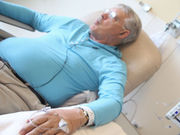For patients ≥40 years, HSCT linked to lower cumulative incidence of remission, worse mortality
THURSDAY, June 2, 2016 (HealthDay News) — For patients ≥40 years of age with Philadelphia (Ph)-negative acute lymphoblastic leukemia (ALL), hematopoietic stem-cell transplantation (HSCT) in first remission is associated with lower cumulative incidence of relapse (CIR), but worse non-relapse mortality (NRM), compared with chemotherapy alone, according to a study published online May 6 in the American Journal of Hematology.
Ofir Wolach, M.D., from the Dana-Farber Cancer Institute in Boston, and colleagues examined whether HSCT in first remission confers a survival benefit versus chemotherapy alone in patients ≥40 years of age with Ph-negative ALL. The outcome of patients treated with HSCT or chemotherapy alone in first remission (40 patients in each cohort) was compared.
The researchers observed no significant difference in three-year overall survival (OS) and disease-free survival (DFS) between the chemotherapy alone and HSCT groups (OS, 46 versus 40 percent; P = 0.35; DFS, 31 versus 40 percent; P = 0.98). The three-year CIR was 61 and 28 percent for the chemotherapy-only and HSCT groups, respectively (P = 0.011), while three-year NRM was 9 and 32 percent, respectively (P = 0.014).
“Allogeneic transplantation for patients ≥40 years with Ph-negative ALL in first remission is associated with a lower CIR but this benefit is offset by considerable NRM as compared with chemotherapy-only approach,” the authors write. “HSCT may be beneficial in patients with high-risk disease features.”
Copyright © 2016 HealthDay. All rights reserved.








